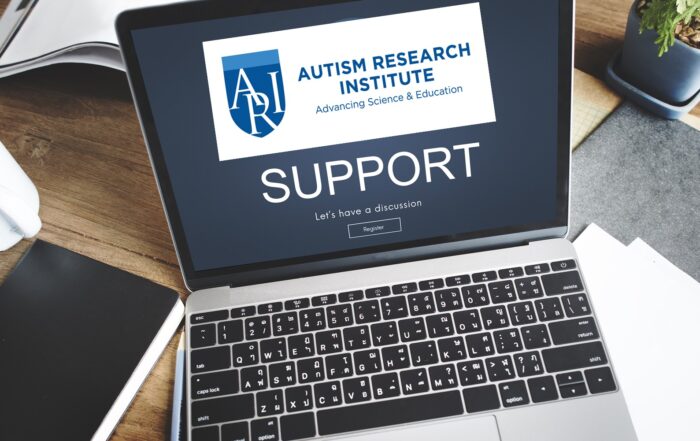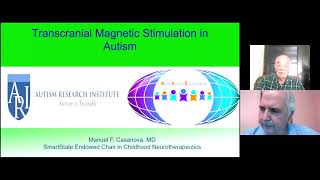For more than 50 years, ARI has dedicated its efforts to pioneering groundbreaking research and sharing free educational resources with people worldwide. One of our primary channels for distributing this information is our free online webinars featuring highly qualified, expert presenters. Check out the five most-watched ARI webinars of 2021.
Hippotherapy for Autism Spectrum Disorders
Chelsea Whitaker, OTR/L, is the founder and COO of Taking the Lead, a non-profit organization that uses therapeutic horseback riding to help individuals with disabilities. In this webinar, Chelsea discusses hippotherapy and how working with the natural movement of horses enables clients to build self-confidence, gain independence and reach their goals. Whitaker provides video examples of therapy exercises and outlines how they can improve communication, physical strength, and focus. She closes with a question & answer session where she discusses training, current research, and more.
TMS and Autism
Manuel Casanova, MD, discusses Transcranial Magnetic Stimulation (TMS) and its potential for treating autism. He details the cerebral cortex development noting revealed differences in mini-columnar morphology and gamma oscillations in individuals with autism. Casanova describes TMS treatments and outlines studies that found a correlation between TMS sessions and increased functionality in numerous cognitive abilities. He posits that TMS could shift our focus from symptomatic treatments to interventions that target core pathologies of autism. The presenter notes that although evidence is hopeful, more research is needed to understand the scope and reach of TMS. Dr. Casanova has served on boards for various organizations, and his research introducing repetitive TMS in autism therapy won a EUREKA award from NIMH.
Medical Comorbidities
Our speaker, Margaret Bauman, MD, is a neurologist at the Boston University School of Medicine and a pioneer in studying and treating autism. In this brief overview, Bauman discusses medical comorbidities associated with autism and how they affect behavior and quality of life. She outlines some common physical comorbidities and details how these issues present differently in autistic individuals. Bauman describes our understanding of challenging behaviors in autism as a form of communication and highlights the importance of knowing the signs. She suggests that individuals with autism who present with unusual behaviors merit a thorough physical and medical checkup and that gastrointestinal issues be assessed first.
The Role of Neurotransmitters in GI Disorders Related to Autism
In this webinar, Kara Gross Margolis, MD, explores recent studies surrounding the roles of serotonin and the gut microbiome in gastrointestinal (GI) and inflammatory conditions related to autism. She presents case studies highlighting different presentations of GI issues in individuals with autism and how those behaviors relate to the gut-brain links. Dr. Margolis outlines several recent studies about the brain-gut-microbiome, bacterial communities, serotonin reuptake, and more. She notes limitations and key findings for each study and discusses their impact on current and future research avenues. Kara Gross Margolis is an Associate Professor of Pediatrics and a pediatric gastroenterologist with clinical expertise in brain-gut axis disorders, specifically in autism.
Auditory Processing and Autism Spectrum Disorders
In this webinar, Sophie Schwartz, Ph.D., discusses auditory processing disorders (ADP) in individuals with autism. She defines auditory processing difficulties and highlights their impact on language acquisition and quality of life. Schwartz outlines her recent research and affirms that atypical responses to sound are caused by biological differences in the brain and are not behavioral problems. She outlines future research avenues and stresses the importance of creating and validating assessments and treatments specific to ADP. Sophie Schwartz is the project manager for the Predicting and Optimizing Language Outcomes research program at Boston University Center for Autism Research Excellence.
What Viewers Say About ARI Webinars
We asked recent attendees to share their thoughts about our webinars and this is what they said. ARI hosts live webinars multiple times each month featuring top researchers and treatment professionals.
Challenges of Medical Care for Seniors
Following introductions by Petra Dilman and Dr. Stephen Edelson, Margaret Bauman, MD, discusses the many medical challenges those aging with autism face. She highlights the lack of medical training and research
Executive Function and Autism
Greg Wallace, Ph.D., discusses executive functioning and its impacts on lived experiences across the lifespan in autism. He defines executive function (EF) as it relates to cognitive processes, the neuropsychological framework, and
Systemic Inflammatory & Autoimmune Diseases—PANS
Jennifer Frankovich MD MS, clinical professor at Stanford University/Lucile Packard Children’s Hospital, discusses the co-occurrence of systemic inflammatory and autoimmune diseases – including the overlap between pediatric acute-onset neuropsychiatric syndrome (PANS) and
Maximizing Neurodiversity: Education & Jobs
Scientist and psychiatrist Lawrence Fung, MD, Ph.D., discusses what neurodiversity is and how increased awareness and support benefits not only neurodiverse individuals but the global population as a whole. He outlines the
TMS and Autism – 2021 Research Updates
Manuel Casanova, MD, discusses Transcranial Magnetic Stimulation and its potential for treating autism. He details the cerebral cortex development and notes revealed differences in mini-columnar morphology and gamma oscillations in individuals with autism.










